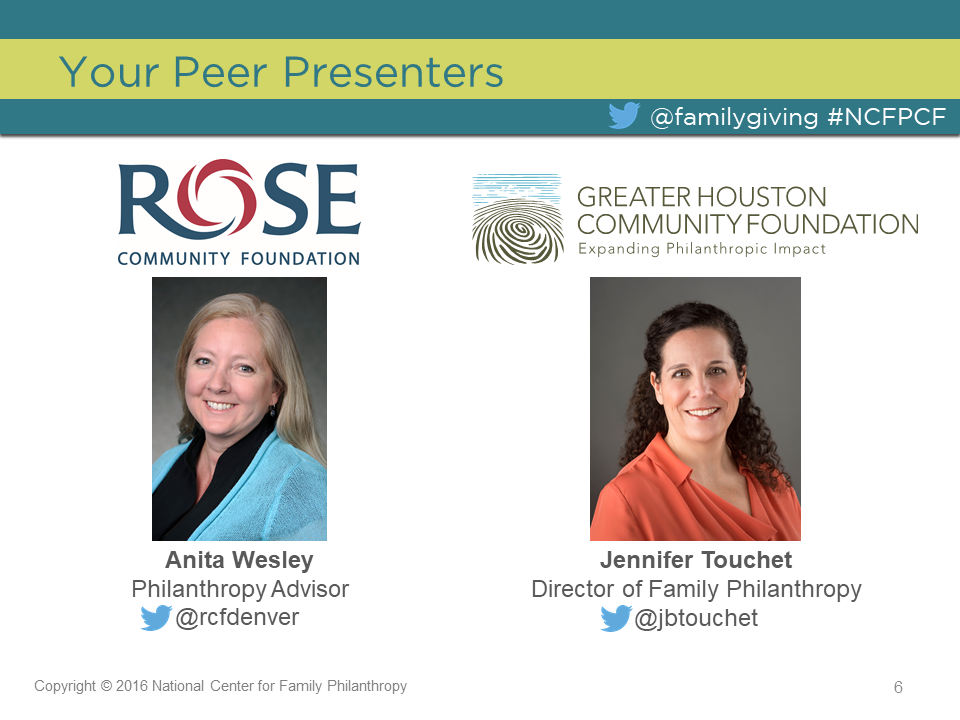Unit 1: Getting Started
In this unit, you’ll learn how other community foundations are staffing their philanthropic services work and the key characteristics and skills they seek in those staff.
“When donor-advised funds first really hit their stride as a popular vehicle, OCF made the decision to separate our donor relations or donor services from our development team…. So the donor relations department is separate. We work very closely with our development team and our grants and programs team, but we could fit right in between each of those functions in the foundation.”
– Laura Winter, Vice President for Donor Relations, The Oregon Community Foundation (Aug. 2016 Spark Session)
DISCUSS: Outline of Family Philanthropy Competencies, Skills, and Knowledge
NCFP developed this list as we developed this Playbook, basing it on what we’d seen in staff of family foundations, community foundations, and advisors to philanthropic families. It can serve as a starting point for creating professional development plans for your staff and exploring resources in this Module, the rest of the Playbook, and NCFP’s larger Knowledge Center.
READ: Tips From Peers
In 2016, NCFP surveyed its community foundation subscribers to learn about the staff delivering their family philanthropy services. Those staff members typically had shifted away from an asset development and gift planning orientation to one of advising, educating, and facilitating. As you think about your staff who will serve philanthropic families, consider these key characteristics recommended by your peers:
- Most important roles to play – philanthropic strategist (guiding families in defining their vision, mission, and goals), steward of family legacy (keeper and transmitter of legacy across generations), facilitator (helping a family to move a decision or process forward), and community educator (staying abreast of, and sharing local insight on, key issues, organizations, and people).
- Most important skills and competencies – oral and written communication, ability to build and maintain trust, commitment to donor intent and family legacy, group facilitation, general understanding of family systems and dynamics, and ability to not impose own values or priorities on a donor.
- Top sources of professional development – NCFP, 21/64 courses, Chartered Advisor in Philanthropy® designation, and Youth Philanthropy Connect.
READ: Essential Reading List [members only]
Your peers and NCFP staff created this “Essential Reading List” of books that have helped them understand effective work with philanthropic families.
TUNE-IN (60 minutes): Spark Session—Staffing Your Family Engagement Program [members only]

In this 2016 webinar, staff of the Greater Houston Community Foundation and Rose Community Foundation how they structured their staff team, the traits and characteristics they look for in team members, and the skills and knowledge they’ve developed. Houston’s work with behavioral competencies is included in the handouts.
TUNE-IN (53 minutes): Topical Call — Professional Development [members only]
In this 2019 call, staff from community foundations in Chattanooga, Chicago, Jacksonville, and Research Triangle kick off a discussion of the professional development programs, courses, and resources their teams have team benefited from.
READ: Client Relationships and Family Dynamics (Grubman and Jaffe, 2010)
Two respected trainers of financial planners share their insights on a staff member’s roles as “general practitioner” for family dynamics and family relationships, core competencies for services to individuals and families, and how a firm (or your community foundation) should be supporting those roles and competencies.
READ: Getting Started as a Family Enterprise Professional

The Family Firm Institute’s 2018 report includes family philanthropy and foundation staff as “family enterprise professionals.” It lists the top characteristics, attributes, roles, and competencies of effective advisors and consultants to wealthy families. The lists will be useful to community foundations wishing to update their philanthropic services positions.
TUNE-IN (54 minutes): Topical Call — Staffing Your Philanthropic Services [members only]
Several community foundations share their staffing models, personal skills/competencies sought, experience or designations valued, how they balance their portfolios of work, and more.
TUNE-IN (60 minutes): Topical Call — Managing Year-End Work [members only]
Several community foundations share how they manage the end-of-year crunch in giving and donor-advised grantmaking, and how they balance good relationship-building and stewardship of philanthropic families when transaction volumes are higher.
BORROW AND ADAPT: Job Description and Org Chart Samples [members only]
Community foundations in Atlanta, Boston, Central New York, Denver area, Houston, Jacksonville, Oregon, Saint Paul, Seattle, and more have provided example job descriptions, organizational charts, and behavioral competency guides.
